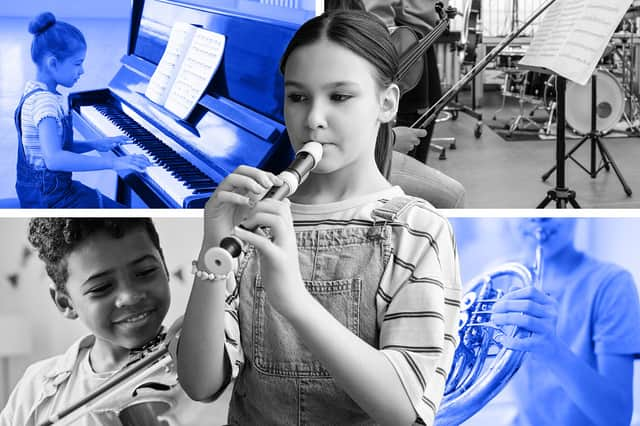Music education: why state schools are falling behind, how is it funded, and what is being done about it
and live on Freeview channel 276
Fortismere School pupils are responsible for five number one singles, two Ivor Novello awards and a Mercury Prize-winning album.
The state school in North London has a rich musical history, producing talents such as Michael Kiwanuka, Jess Glynne and Clean Bandit. However this incredible back catalogue of talent could be at risk, as the number of state school students studying music at GCSE has been dropping steadily.
Advertisement
Hide AdAdvertisement
Hide AdWhile on the classical page, the Royal Philharmonic Orchestra’s annual report found a lot more could be done to get schoolchildren into orchestral music.
Edward Jefferies, who is director of music at Fortismere School, told NationalWorld that a decline in music opportunities at state schools began with Michael Gove, roughly since the introduction of the English Baccalaureate (EBacc).


He said: "I feel like our young people are being controlled and that they should have the chance to express themselves in whatever form they wish during their GCSEs...if the government was serious about it, they would include the arts... and it's a little bit soul destroying I think for some teachers because we just end up loving the subject and wanting the kids to love it. The kids ended up loving it and then there just isn't the support for it from the government."
He said the subject feels devalued in schools and that music is one of the first subjects that tend to be pushed out - with a preference to core subjects. The teachers, without support, are becoming harder to recruit.
Advertisement
Hide AdAdvertisement
Hide AdMr Jefferies said: "People are becoming worried that it will be private schools within the country where musical excellence takes place, and it's going to be affluent, middle-class areas, where music is going to flourish because of the background of the children. Inner city schools are going to end up struggling because at the end of the day, those are the parents that can't necessarily afford to pay for tuition."
Fortismere, where many big names in the music industry were educated, has a high focus on its music programme - which is self-funded. The school produces a number of ensembles, with a diverse and interesting curriculum that they try and engage students with. Therefore if pupils make the decision to drop music, they are still taught something interesting.
The school uses the concerts - which are monetised, to feed back into the department to ensure the kids can get the opportunity to play instruments - as it's all about student engagement to keep them connected to music.
As it is in Muswell Hill, north London, they already have a large number of students coming in which have played an instrument or are playing an instrument. Mr Jefferies said: "Around two thirds of the hands will go up in any year group. Of around 270 pupils about 180 will come in having played a musical instrument or currently playing a musical instrument."
Advertisement
Hide AdAdvertisement
Hide Ad

Music organisation UK Music’s chief executive, Jamie Njoku-Goodwin, agrees with the idea that music should be accessible to anyone - regardless their background. He said: “It’s critical that a high-quality music education is available to everyone, regardless of their background. I want to see more young people learning music at school - and so we should be doing everything we can to make sure more children are taking music at school. Music enriches children’s lives. It also boosts our health and wellbeing, makes a massive social and economic contribution, and boosts our reputation abroad.”
The report from the RPO highlighted how the number of students who have taken a music GCSE declined in the past academic year. To this, Mr Jefferies says it fluctuates at the school as it's a hard GCSE. He said: "The government has definitely centred it more towards students that have prior knowledge and prior learning, so it does favour some kids that are playing to a higher level than others.
“To get music teachers, you will have to be in a decent area, with decent staff, because people are not training to be teachers”.
In 2022, the government launched its National Plan for Music, which includes £25 million to allow schools to purchase around 200,000 musical instruments and equipment. It says a further £70 million will be made available every year until 2025 for the Music Hubs programme.
Advertisement
Hide AdAdvertisement
Hide AdA Department for Education spokesperson said that it is investing more for young people to learn musical instruments. They said that by September 2024, Music Hubs will receive £25 million to "fund a wide variety of instruments for children and young people”.
“These will include both traditional instruments and adapted instruments. Adapted instruments are especially designed so that children and young people with SEND (special educational needs & disabilities) can participate in music,” the spokespersons said.
The idea behind the programme is to deliver high-quality music education offered to all children and young people in England by 2030. In order to assist the decision making process for the new geographies for Music Hubs, Arts Council England is asking for feedback through a conversation and consultation phase to help provide an important opportunity for the music, education, youth, creative and cultural sectors to directly share their views and suggestions.
Although Mr Jefferies is aware of the government funding coming in through the hubs, he says schools are struggling with paying their bills. He said: "Whilst it's really nice that they say this is what we're going to do and this is what we will support. I think it's the amount of money being also ploughed into schools at the moment and teacher salaries. The money simply is not there at this point in time to be able to pay for quality music education."
Comment Guidelines
National World encourages reader discussion on our stories. User feedback, insights and back-and-forth exchanges add a rich layer of context to reporting. Please review our Community Guidelines before commenting.
